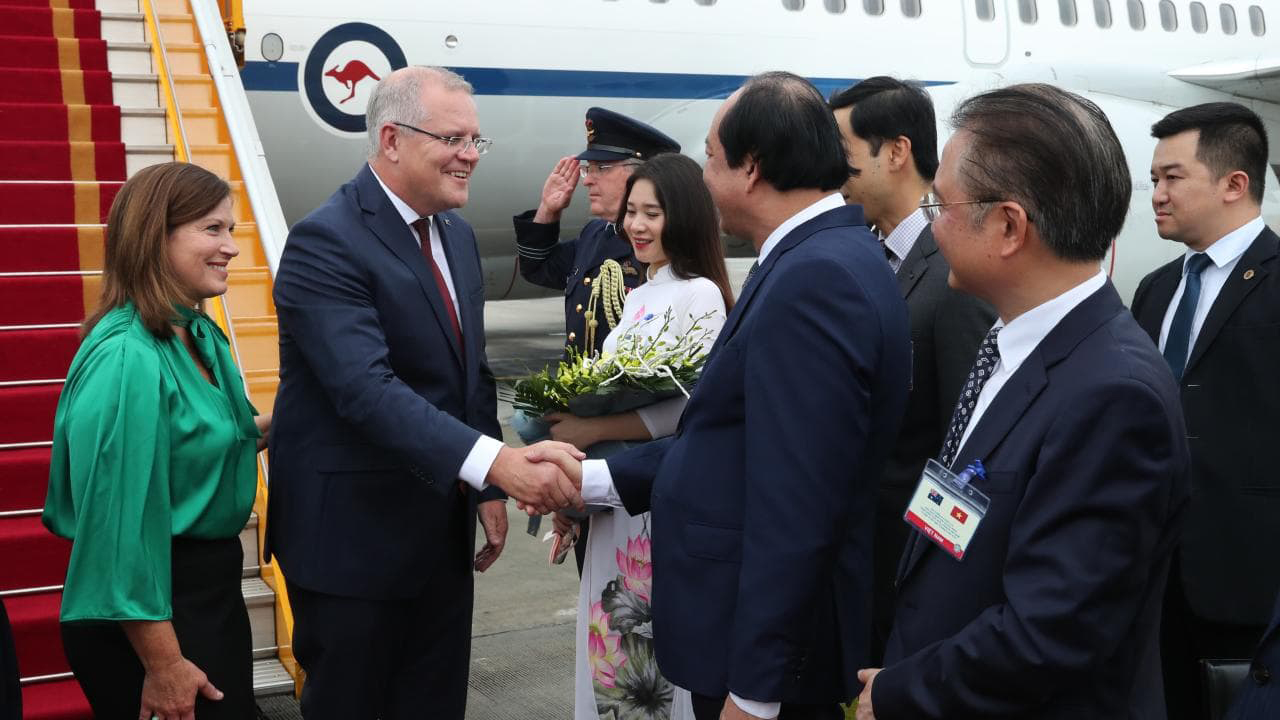As the Pacific’s banana republics eagerly grasp at the rivers of yuan gushing from Beijing and cock opportunistic snooks at Australia, PM Scott Morrison is strengthening ties with a nation that has far less reason to trust China’s expansionism in the region.
Of course, Australia and Vietnam are not without their own “history”. The Vietnam War is still a living memory on both sides. But Vietnam also has far more recent history with China, which briefly invaded the country in 1979, and maintained hostilities until the end of the 80s. More recently, China’s aggressive expansionism in the South China Sea is worrying Hanoi every bit as much as it does Washington or Canberra.
Scott Morrison has vowed to stand with Vietnam to push for a free and open Indo-Pacific amid growing Chinese pressure on the Southeast Asian nation, declaring that if Australia’s neighbours “suffer coercion, then we are all diminished”.
Making the first bilateral visit by an Australian prime minister to Vietnam since Paul Keating in 1994, Mr Morrison tonight committed to deepen co-operation with the rising economic star and work together to strengthen regional stability.
The move follows a month-long standoff between Vietnamese ships and a Chinese oil survey vessel in Vietnam’s exclusive economic zone, which has reignited a long-running territorial battle in the disputed South China Sea over the ownership of oil, gas and fisheries resources.
While it might seem like a clever short-term gain for Pacific nations to play Australia and China against each other and scrabble for the pennies where they fall, it might also pay to consider the long-term strategic risks. There ain’t no free Chinese takeaway.
In Hanoi tonight, Mr Morrison […][declared] “it makes sense for us to work together” in a high-level strategic partnership.
“We share a vision for an open, inclusive and prosperous Indo-Pacific neighbourhood; an Indo-Pacific where we respect each other’s sovereignty and independence,” the Prime Minister said.
“Because if we allow the sovereignty or independence of any of our neighbours to suffer coercion, then we are all diminished…
Vietnam is looking for Australia’s support to ensure a free flow of trade through the South China Sea, including by maintaining freedom of navigation exercises.
Australian Strategic Policy Institute executive director Peter Jennings said a recommitment by Australia and other nations to free and open seas would help to counter Chinese efforts to monopolise international waters.
Meanwhile, Pacific nations also ought to remember that they’re little more than a cash drain on whoever their patron happens to be. Australia’s relationship with Vietnam has economic and strategic benefits for both.
With Vietnam’s fast-growing economy, rising middle class, a population of about 97 million — 55 million of whom are of working age — and a suite of free-trade agreements under its belt, Mr Morrison said his government saw the country’s potential, and the challenge now was to “turn potential into reality” […]The relationship with the former Vietnam War foe has been transformed in recent years and was elevated to a “strategic partnership” level in late 2017 […]
Two-way trade between Australia and Vietnam reached $14.5 billion last year. Only Australia’s trade with India is growing at a faster rate.
theaustralian.com.au/nation/politics/morrison-bolsters-vietnam-amid-china-territory-row
Australia and Japan have “history” too. The nations were the bitterest of enemies in the 1940s. Within a decade of WWII’s end, though, the two countries were resuming normal relations. Today, the former enemies enjoy a solid and reciprocal relationship at all levels: strategic, economic and cultural. Australia’s relations with Vietnam are following a similarly reciprocal path.
Pacific nations might be well advised to remember that they can only bite the hand that aids them for so long.

